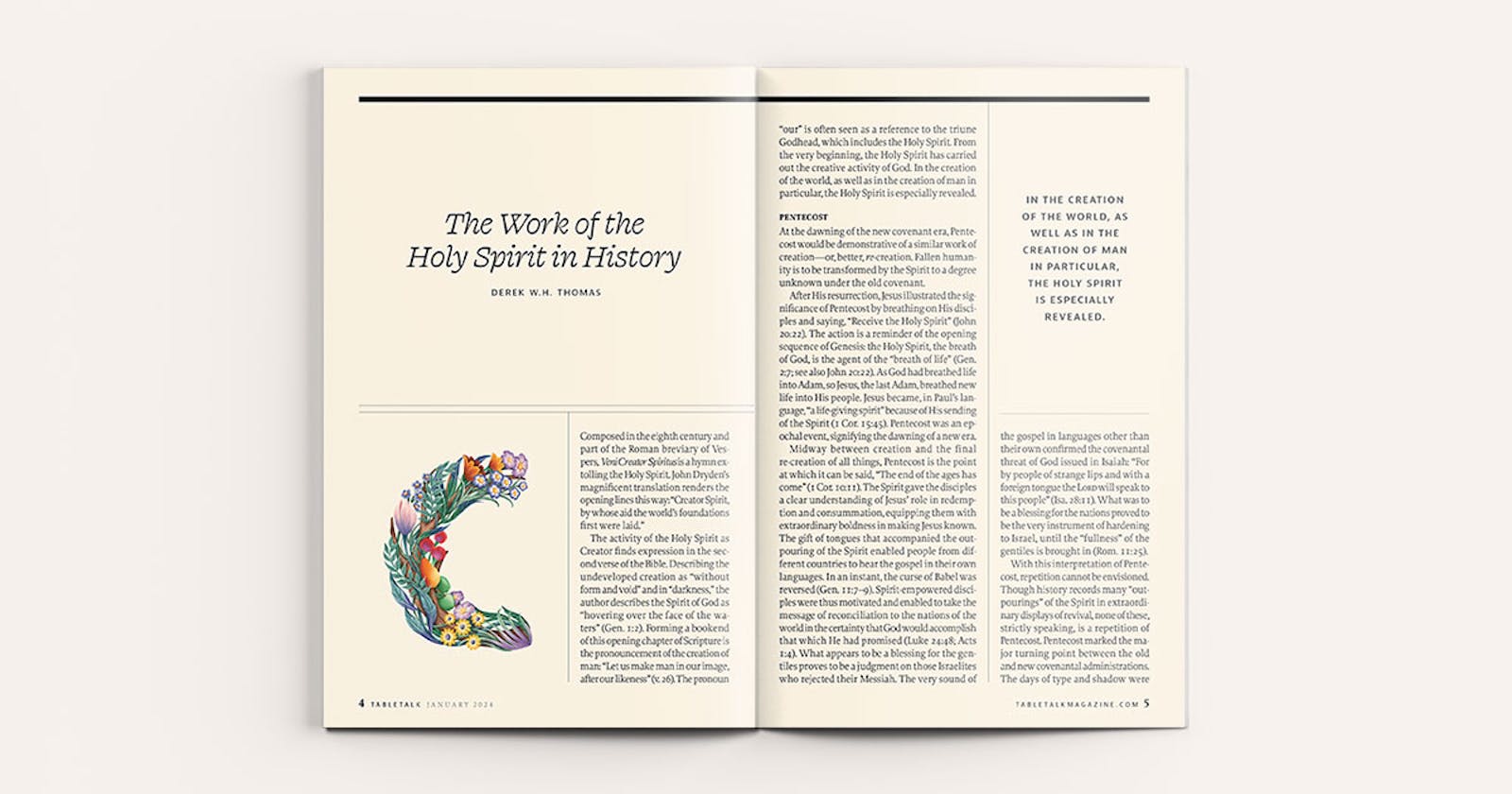The Work of the Holy Spirit in History
From TABLETALK
Composed in the eighth century and part of the Roman breviary of Vespers, Veni Creator Spiritus is a hymn extolling the Holy Spirit. John Dryden’s magnificent translation renders the opening lines this way: “Creator Spirit, by whose aid the world’s foundations first were laid.”
The activity of the Holy Spirit as Creator finds expression in the second verse of the Bible. Describing the undeveloped creation as “without form and void” and in “darkness,” the author describes the Spirit of God as “hovering over the face of the waters” (Gen. 1:2). Forming a bookend of this opening chapter of Scripture is the pronouncement of the creation of man: “Let us make man in our image, after our likeness” (v. 26). The pronoun “our” is often seen as a reference to the triune Godhead, which includes the Holy Spirit. From the very beginning, the Holy Spirit has carried out the creative activity of God. In the creation of the world, as well as in the creation of man in particular, the Holy Spirit is especially revealed.
pentecost
At the dawning of the new covenant era, Pentecost would be demonstrative of a similar work of creation—or, better, re-creation. Fallen humanity is to be transformed by the Spirit to a degree unknown under the old covenant.
After His resurrection, Jesus illustrated the significance of Pentecost by breathing on His disciples and saying, “Receive the Holy Spirit” (John 20:22). The action is a reminder of the opening sequence of Genesis: the Holy Spirit, the breath of God, is the agent of the “breath of life” (Gen. 2:7; see also John 20:22). As God had breathed life into Adam, so Jesus, the last Adam, breathed new life into His people. Jesus became, in Paul’s language, “a life-giving spirit” because of His sending of the Spirit (1 Cor. 15:45). Pentecost was an epochal event, signifying the dawning of a new era.
Midway between creation and the final re-creation of all things, Pentecost is the point at which it can be said, “The end of the ages has come” (1 Cor. 10:11). The Spirit gave the disciples a clear understanding of Jesus’ role in redemption and consummation, equipping them with extraordinary boldness in making Jesus known. The gift of tongues that accompanied the outpouring of the Spirit enabled people from different countries to hear the gospel in their own languages. In an instant, the curse of Babel was reversed (Gen. 11:7–9). Spirit-empowered disciples were thus motivated and enabled to take the message of reconciliation to the nations of the world in the certainty that God would accomplish that which He had promised (Luke 24:48; Acts 1:4). What appears to be a blessing for the gentiles proves to be a judgment on those Israelites who rejected their Messiah. The very sound of the gospel in languages other than their own confirmed the covenantal threat of God issued in Isaiah: “For by people of strange lips and with a foreign tongue the Lord will speak to this people” (Isa. 28:11). What was to be a blessing for the nations proved to be the very instrument of hardening to Israel, until the “fullness” of the gentiles is brought in (Rom. 11:25).
From start to finish, the Spirit’s aim is to bring about the new creation in which the splendor of God’s work will be displayed.
With this interpretation of Pentecost, repetition cannot be envisioned. Though history records many “outpourings” of the Spirit in extraordinary displays of revival, none of these, strictly speaking, is a repetition of Pentecost. Pentecost marked the major turning point between the old and new covenantal administrations. The days of type and shadow were replaced by days of fulfillment and reality. Pentecost signaled the end of a redemptive economy largely (though not exclusively) focused on ethnic Israel, heralding instead the dawn of a covenant community made up of all peoples that was strongly hinted at in the Old Testament but never realized. The very presence of the miraculous that accompanied Pentecost was itself indicative of the uniqueness of the moment. It marked the appearance of the Apostles—God’s foundational, rather than ongoing, church builders (Eph. 2:20).
the bible
As pilgrim-saints regenerated, indwelt, and sanctified by the Holy Spirit, on our way to the new Jerusalem, we are still in need of wisdom; this the Spirit provides. It is He who guaranteed that a sure guide to heaven would be given to the people of God. Speaking of the Old Testament, Peter could say that no part of it was the product of man’s devising, “but men spoke from God as they were carried along by the Holy Spirit” (2 Peter 1:21). And Paul could echo that “all Scripture is breathed out by God” (2 Tim. 3:16). Just how the Spirit accomplished this remains something of a mystery. There are the discernible fingerprints of human authors throughout the Bible. At the same time, every part of it, down to the least stroke of a pen (see Matt. 5:18), is the product of the out-breathing of God. In two processes—disclosing wisdom and truth to biblical authors and breathing out—the Spirit exercises His lordship in infallibly inspiring the Scriptures. In three processes—receiving and recognizing (canonization), preserving, and translating—the church responds to the Spirit’s work in forming the Scriptures.
The Bible, the Spirit’s rule and guide, is what Christians need for holiness and final redemption. By the Spirit’s illumination of the written text, God’s will is made clear. As Christians, we are currently “waiting for new heavens and a new earth in which righteousness dwells” (2 Peter 3:13). In the state of glory, as the Dutch theologian Geerhardus Vos points out, the Holy Spirit will be “the permanent substratum of the resurrection-life.” The Spirit, who has served the Father and brought glory to the Son, will then be the One who sustains the eternal lives of the saints. Until that day, when “God [will] be all in all” (1 Cor. 15:28), we traverse a terrain filled with obstacles and adversities. We face a threefold enemy: the world, the flesh, and the devil. The Spirit, the representative agent of Christ in our hearts, ensures that victory is certain. He ensures that the bondage and frustration brought into the world through Adam’s fall are reversed.
new creation
At the other end of the Bible, the book of Revelation depicts the “seven spirits” that are “sent out into all the earth” (Rev. 5:6; see also 1:4); the spirits are symbolic of the Holy Spirit as the immanent One who carries out the purposes of God. The hovering Spirit who watched over the formless creation now broods over the cosmos, seeking to bring about a new creation, thereby ensuring its formation according to the perfect plan of God.

As the divine artist, the Holy Spirit ensured the beauty of Eden as much as the rest of creation: “It was very good” (Gen. 1:31). Note Moses’ observation that in the design of the tabernacle (the symbol of God’s presence with His redeemed people), its architects, Bezalel and Oholiab, were “filled . . . with the Spirit of God” (Ex. 31:3). Moses seems to revel in their concern for beauty and order. There was an evident aesthetic pleasure to the tabernacle—and this demonstrated the design of the Holy Spirit (Ex. 35:30–35). Likewise, the Holy Spirit lies behind every work of artistry. As John Calvin wrote, “The knowledge of all that is most excellent in human life is said to be communicated to us through the Spirit of God.”
The end in view for the Spirit is glory—the glory that Adam failed to achieve in the garden. When prophets of the Holy Spirit depict the work of the Spirit, they envision this glory restored after
the Spirit is poured upon us from on high,
and the wilderness becomes a fruitful field,
and the fruitful field is deemed a forest.
Then justice will dwell in the wilderness,
and righteousness abide in the fruitful field.
And the effect of righteousness will be peace,
and the result of righteousness, quietness and trust forever. (Isa. 32:15–17)
The Holy Spirit of God, who first hovered over the waters of creation, spoke through the prophets and Apostles and was poured out at Pentecost as a witness to Christ’s promise of another Paraclete (comforter, sustainer, equipper, counselor). Jesus continues His ministry to His disciples by means of the Spirit as His personal representative agent. The Spirit’s work, at all times, is to draw attention to Christ. “He will glorify me,” Jesus said, “for he will take what is mine and declare it to you” (John 16:14).
From start to finish, the Spirit’s aim is to bring about the new creation in which the splendor of God’s work will be displayed. It is principally of the Holy Spirit’s work that we sing in Charles Wesley’s words:
Finish, then, thy new creation;
Pure and spotless let us be;
Let us see thy great salvation
Perfectly restored in thee;
Changed from glory into glory,
Till in heav’n we take our place,
Till we cast our crowns before thee,
Lost in wonder, love, and praise.
Editor’s note: This article was originally published in July 2004.
Dr. Derek W.H. Thomas is senior minister of the First Presbyterian Church in Columbia, S.C., and Chancellor’s Professor of Systematic and Pastoral Theology at Reformed Theological Seminary. He is a Ligonier Ministries teaching fellow and author of many books, including How the Gospel Brings Us All the Way Home.


Recent Comments